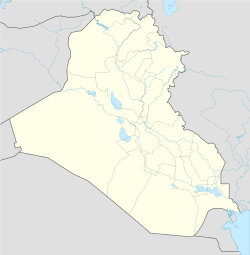| Ankawa ܥܢܟܒܐ | |
|---|---|
|
Coordinates: 36°13′45″N 43°59′37″E / 36.22917°N 43.99361°ECoordinates: 36°13′45″N 43°59′37″E / 36.22917°N 43.99361°E{{#coordinates:36|13|45|N|43|59|37|E|type:city(30000)_region:IQ-AR |primary |name= }} | |
| Country | Iraq |
| Governorate | Erbil |
| Municipality | Ankawa |
| Population (2011) | |
| • Total | 30,000 |
| The town received thousands of Chaldean refugees from Baghdad and Mosul | |
Ankawa (a.k.a. Ainkawa) (Syriac: ܥܢܟܒܐ, Arabic: عنكاوا, ‘ankāwā) is an Chaldean suburb of Erbil.[1] It is sometimes referred to as the "Chaldean Quarter" of Erbil.
Location
It is located five miles northwest of downtown Erbil.
History
Ankawa was originally called Beth Amka, which later morphed to Amku-Bad, Amkawa, and finally Ankawa. The name of the town has been mentioned in different historical books, including Bar Hebraeus's book entitled "A Brief History of the Countries," where he states: "Mongolian troops attacked the area of Erbil on Sunday July 1285 and reached some villages.....including Ankawa."
Ankawa has many archaeological sites, including "The Hill," which was recorded as an archaeological site in Iraq in 1945. It is also home to St Joseph's Cathedral (Umra d'Mar Yosip), the seat of the Chaldean Catholic archbishop of Erbil.[1]
In 2014, it became a refuge for Christians from central Iraq, who were expelled by ISIS isurgents.[1]
References
Cite error: Invalid <references> tag;
parameter "group" is allowed only.
<references />, or <references group="..." />